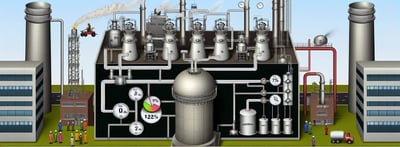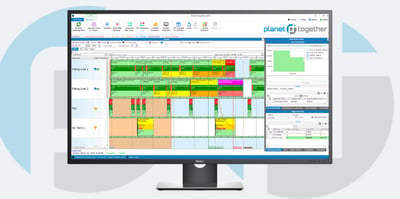AI-Driven Production Yield Prediction
In manufacturing, especially within the chemical industry, staying competitive and efficient is essential. The integration of cutting-edge technologies is crucial to achieving this goal. In recent years, artificial intelligence (AI) has taken center stage, and one of its most promising applications in manufacturing is AI-driven production yield prediction.
In this blog, we will explore the significance of AI-driven production yield prediction, its role in chemical manufacturing, and how it can be seamlessly integrated into existing systems like SAP, Oracle, Microsoft, Kinaxis, Aveva, and other ERP, SCM, and MES systems using PlanetTogether as an example.

Production Yield in Chemical Manufacturing
Production yield, also known as yield efficiency, is a critical performance metric in the chemical manufacturing industry. It represents the percentage of high-quality products obtained from raw materials during a production process. Maximizing production yield is essential because it directly impacts profitability, resource utilization, and overall operational efficiency.
Historically, predicting production yield accurately has been a challenging task. It relies heavily on complex factors such as raw material quality, environmental conditions, equipment performance, and process variability. Traditional methods often involve manual data collection, spreadsheets, and simplistic models that struggle to adapt to the dynamic nature of chemical manufacturing processes.
This is where AI-driven production yield prediction steps in as a game-changer. By harnessing the power of AI and machine learning algorithms, chemical manufacturing facilities can predict production yield with unparalleled accuracy, enabling them to make informed decisions and optimize their processes in real-time.

The Role of AI in Production Yield Prediction
Artificial intelligence leverages advanced algorithms and data analysis techniques to process vast amounts of historical and real-time data. When applied to production yield prediction, AI can:
Data Integration: Collect and integrate data from various sources within the manufacturing facility, including sensors, equipment, laboratory results, and historical production data.
Pattern Recognition: Identify complex patterns and correlations in the data that human operators might miss.
Real-Time Monitoring: Continuously monitor production processes and detect anomalies or deviations that could affect yield.
Predictive Analytics: Utilize machine learning models to predict production yield based on the current process conditions and historical data.
Optimization: Recommend real-time adjustments to the production process to maximize yield and minimize waste.
Root Cause Analysis: Identify the root causes of yield losses, allowing for targeted improvements.
Scenario Analysis: Analyze "what-if" scenarios to assess the impact of process changes on production yield.
Integration with ERP, SCM, and MES Systems
The seamless integration of AI-driven production yield prediction into existing Manufacturing Execution Systems (MES), Enterprise Resource Planning (ERP), and Supply Chain Management (SCM) systems is crucial for realizing its full potential. In this section, we will focus on integrating PlanetTogether, a renowned production planning and scheduling software, with ERP systems like SAP, Oracle, Microsoft Dynamics, Kinaxis RapidResponse, Aveva, and other similar platforms.


The Role of PlanetTogether in AI-Driven Production Yield Prediction
PlanetTogether is a powerful tool for production planning and scheduling. It excels in optimizing production processes, ensuring efficient resource allocation, and meeting production deadlines. When integrated with AI-driven production yield prediction, it can revolutionize the way chemical manufacturers plan and execute their production processes.
Here's how PlanetTogether plays a pivotal role:
Data Exchange: PlanetTogether acts as a bridge between the AI-driven yield prediction system and other ERP, SCM, and MES systems. It facilitates the exchange of real-time production data, schedules, and resource allocations.
Real-Time Adjustments: When the AI system predicts a potential yield deviation, PlanetTogether can automatically adjust the production schedule to optimize yield while meeting customer demand.
Scenario Planning: Manufacturers can use PlanetTogether to model different production scenarios based on the AI-driven predictions. This enables proactive decision-making to mitigate yield losses.
Resource Optimization: PlanetTogether ensures that the right resources, such as personnel, equipment, and materials, are allocated optimally to maximize yield.

Integration Steps with ERP, SCM, and MES Systems
Integrating AI-driven production yield prediction with ERP, SCM, and MES systems is a multi-step process. While the specific steps may vary based on the chosen ERP system and AI platform, here's a general overview:
Data Preparation
Before integration, ensure that data from various sources, such as sensors, equipment, and historical records, is accessible and structured for analysis.
AI Platform Integration
Connect the AI-driven yield prediction platform to your ERP, SCM, or MES system. Most modern AI platforms offer APIs or connectors for seamless integration.
Data Ingestion
Configure the integration to allow real-time data ingestion from your manufacturing processes. This should include production schedules, resource allocations, and equipment performance data.
Data Analysis
Set up the AI platform to analyze the incoming data and make real-time predictions regarding production yield.
Alerts and Notifications
Configure the system to send alerts and notifications when potential yield deviations or anomalies are detected.
Decision Support
Integrate the AI system with decision support tools within your ERP, SCM, or MES system. This allows for automatic adjustments to production schedules and resource allocations.
Reporting and Visualization
Implement reporting and visualization tools to provide insights into production yield predictions and the impact of AI-driven adjustments.
Training and Monitoring
Train personnel to use the integrated system effectively and monitor its performance over time to ensure continuous improvement.
Benefits of Integration
Integrating AI-driven production yield prediction with ERP, SCM, and MES systems offers several significant benefits for chemical manufacturing facilities:
Enhanced Accuracy: Real-time data integration and AI-driven predictions result in highly accurate production yield forecasts.
Cost Reduction: Optimized resource allocation and reduced waste lead to cost savings.
Improved Efficiency: Streamlined production processes and real-time adjustments improve overall operational efficiency.
Faster Decision-Making: AI-driven insights enable faster and more informed decision-making, reducing the impact of yield deviations.
Competitive Advantage: Manufacturers gain a competitive edge by consistently delivering high-quality products on time and within budget.
Challenges and Considerations
While the integration of AI-driven production yield prediction offers numerous advantages, it also comes with its set of challenges and considerations:
Data Quality: The accuracy of predictions heavily relies on the quality and availability of data. Ensure data collection processes are robust and reliable.
Change Management: Implementing AI-driven solutions requires a cultural shift and may encounter resistance from employees accustomed to traditional methods.
Cybersecurity: Protecting sensitive production data from cyber threats is paramount. Robust cybersecurity measures must be in place.
Initial Investment: There might be upfront costs associated with implementing AI-driven systems and integrating them with existing ERP, SCM, and MES systems.
Maintenance and Updates: AI systems require regular maintenance and updates to ensure continued accuracy and performance.
AI-driven production yield prediction is a transformative technology for chemical manufacturing facilities. By accurately predicting production yield, chemical manufacturers can optimize resource allocation, reduce waste, and stay competitive in a rapidly evolving industry.
The seamless integration of AI-driven solutions like PlanetTogether with ERP, SCM, and MES systems is the key to unlocking the full potential of this technology. It empowers manufacturers to make real-time, data-driven decisions that enhance production yield and profitability while maintaining high product quality.
As the chemical manufacturing industry continues to evolve, embracing AI-driven production yield prediction is not just a choice but a necessity for those looking to thrive in an increasingly competitive landscape. By harnessing the power of AI, chemical manufacturers can pave the way for a more efficient, sustainable, and profitable future.
Are you ready to take your manufacturing operations to the next level? Contact us today to learn more about how PlanetTogether can help you achieve your goals and drive success in your industry.